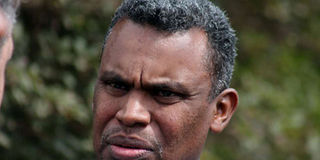Noordin Haji's attack on the Judiciary likely to ignite tension

Director of Public Prosecutions Noordin Haji. His attack on the Judiciary for allegedly frustrating the fight against graft could expose the underlying tensions between the various arms of government. PHOTO | FILE | NATION MEDIA GROUP
What you need to know:
- Mr Haji had also taken issue with courts granting suspects conservatory orders stopping investigations against the individuals.
- For some within the Judiciary, the coincidence of the DPP and the IG remarks is questionable.
- The tensions between the Judiciary, ODPP and the police are just but a reflection of what is happening generally in government.
- President Uhuru Kenyatta has criticised the MPs for always pushing for salary rise at the expense of Kenyans.
The Director of Public Prosecutions (DPP) Noordin Haji’s attack on the Judiciary for allegedly frustrating the fight against corruption could mark a turning point in the relations between his office and the courts, and expose the underlying tensions between the various arms of government.
After starting off his anti-corruption crusade with a plea to the Judiciary to have “our institutions (Judiciary and office of DPP) robustly implement section 4(4) of the Anti-Corruption and Economic Crimes, that is, the hearing of corruption cases on a day-to-day basis until conclusion,” his remarks during an interview with Citizen television appear to have rubbed the Judiciary the wrong way and worsened the relationship which dipped after the arrest of Deputy Chief Justice (DCJ) Philomena Mwilu in August.
BAIL TERMS
“We have charged individuals be they governors, constitutional office holders or the DCJ herself. My concern is that most of the suspects still remain in office and the sad thing is that we still have orders to allow them to enjoy whatever is coming from the courts. Some of the bail terms, for example in a particular case to do with a governor, are wanting. We saw him making presentations before international development partners and this is somebody who is facing a murder charge, has an ongoing investigations into allegations of corruption and was also found with unexplained guns in his premises. We must have standards and those standards need to be applied across board and the courts need to help us,” Mr Haji said in the interview.
Mr Haji had also taken issue with courts granting suspects conservatory orders stopping investigations against the individuals.
BOTTLENECKS
“So far, I am not happy because if I didn’t have these bottlenecks, if I didn’t have all these conservatory orders, I would have done much more,” he said.
Inspector General of Police Joseph Boinnet also waded in pointing a finger at the Judiciary for frustrating the fight against terrorism by acquitting suspects.
For some within the Judiciary, the coincidence of the DPP and the IG remarks is questionable.
Chief Justice (CJ) David Maraga has already alluded to the tensions in public remarks on Friday as he presided over the official opening ceremony of the Nyando Law Courts.
“Instead of praising us for restructuring ourselves to serve wananchi better, they are attacking us. We have only reviewed our structures to facilitate greater efficiency in the delivery of services to the people,” he said.
CRITICISMS
The CJ has also made a more pointed statement to the Nation who reached out to him in light of the criticisms.
"As I have said many times, if a case is properly investigated and sufficient evidence gathered and presented in court, the people of Kenya can expect a conviction and punishment. First and foremost, those doing investigations and prosecution must do their work properly," he told the Nation.
As the three — the Judiciary, ODPP and the National Police Service — sulk at each other, Law Society of Kenya (LSK) President Allen Gichuhi says the tension is unnecessary at this time.
“It is a bit premature to accuse the Judiciary of frustrating the cases because one is dissatisfied with bail terms given to suspects. I also don’t think the Judiciary should really be concerned because criticism will always be there,” said Mr Gichuhi.
PERSONAL OPINIONS
Mr Gichuhi said the statements attributed to Mr Haji are his personal opinions.
“In my view that should not alarm the Judiciary because that is the opinion of the DPP. The true test will be when the trials commence and whether convictions or acquittals will come at the end of the day,” he said.
The tensions between the Judiciary, ODPP and the police are just but a reflection of what is happening generally in government.
Every arm of the government and agency is fighting for its place in an attempt to control the other.
Judiciary in particular has been on the receiving end particularly from the Executive not particularly happy with some of the decisions from the courts, with the nullification of the August 2017 presidential election often used to define the Judiciary.
BUDGET SQUEEZE
For the current financial year, the Judiciary suffered a major budget squeeze when it was initially allocated just Sh14.5 billion of the Sh31.2 billion it had requested. It got an additional Sh1.5 billion through supplementary budget, but only after coming out to state their grievances to the public.
Meanwhile, the battle of supremacy has also got Parliament which is currently duelling with the Executive over the new perks the MPs are demanding and the enactment of the Parliamentary Service Commission Bill, 2018, which seeks to take away from Salaries and Remuneration Commission the power to determine the lawmakers’ terms of service.
President Uhuru Kenyatta has criticised the MPs for always pushing for salary rise at the expense of Kenyans.
At the same time, some MPs have made calls for impeachment of the Interior Cabinet Secretary Fred Matiang’i on allegations of snubbing summons to appear before House Committees.




